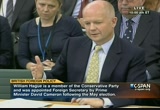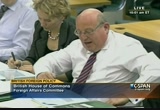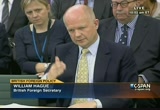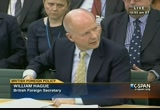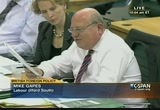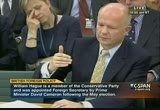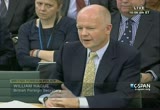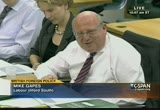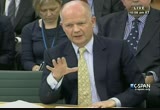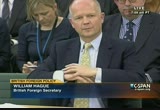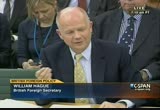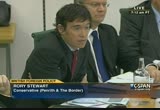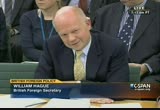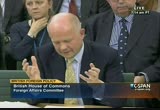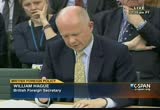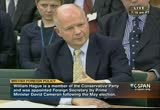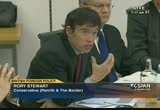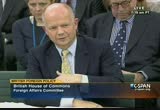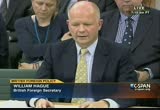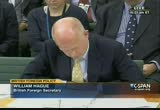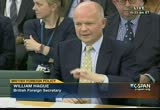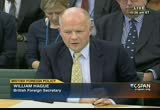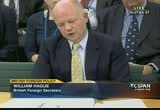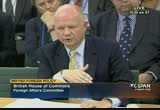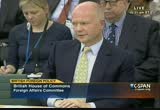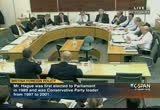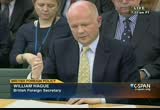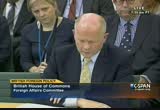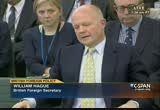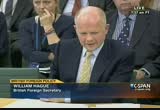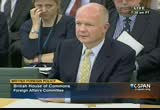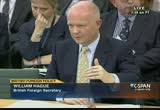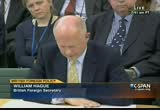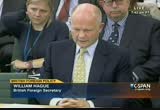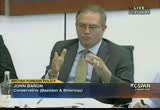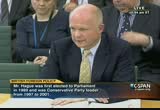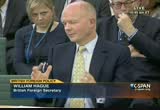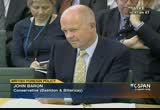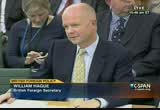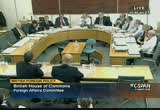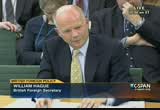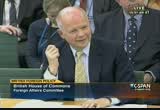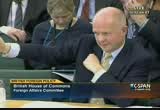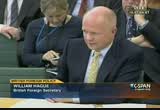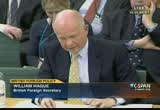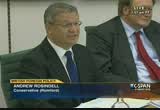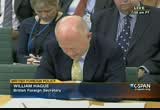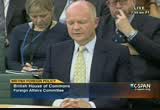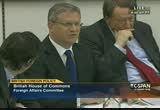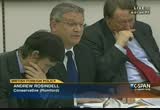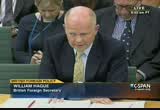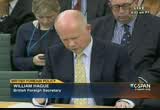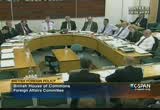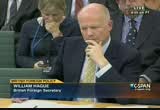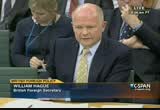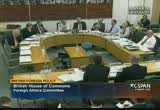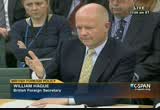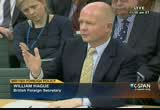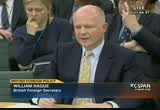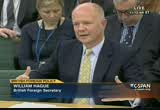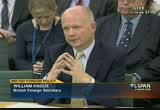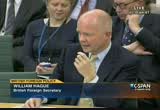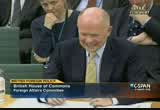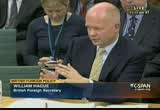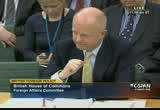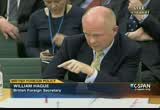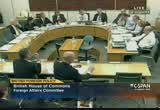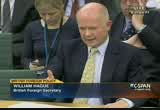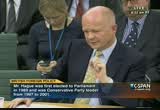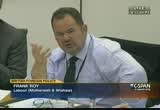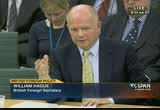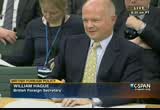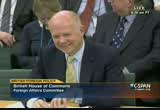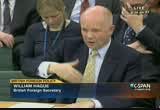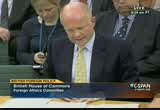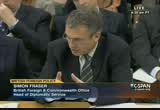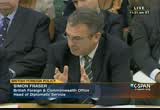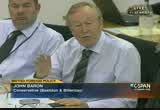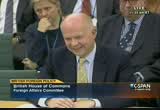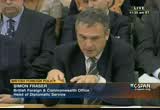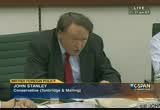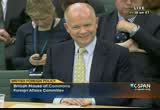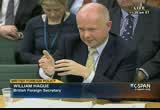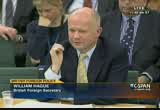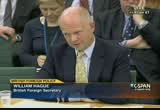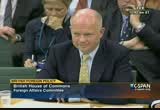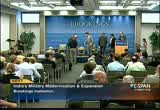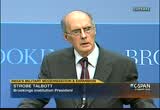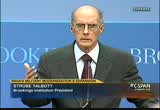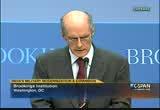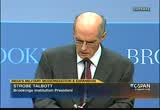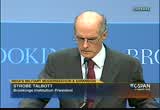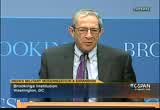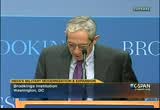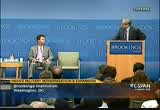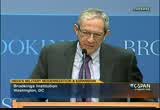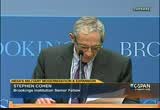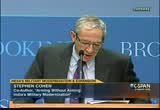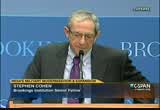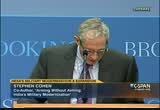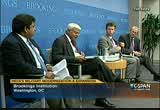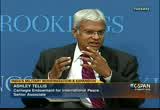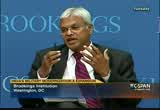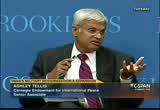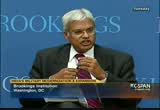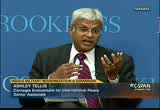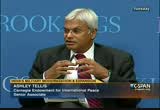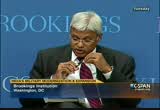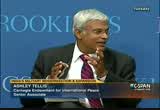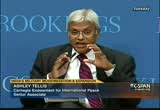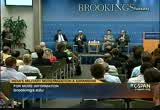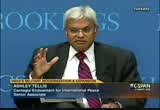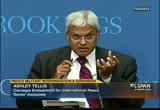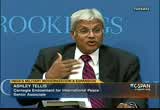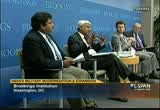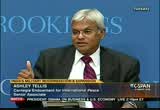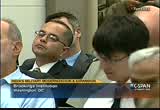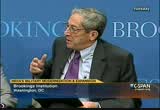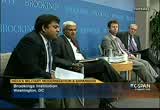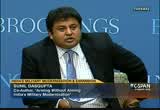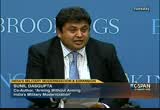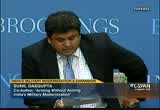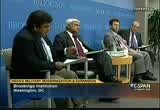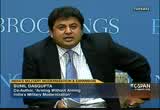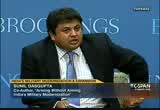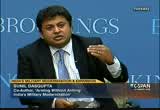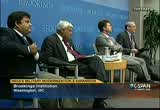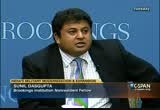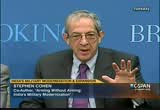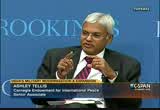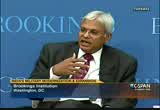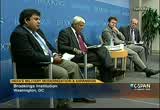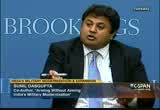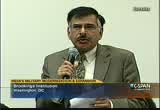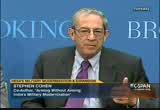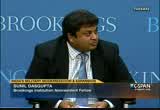tv U.S. House of Representatives CSPAN September 8, 2010 10:00am-1:00pm EDT
10:00 am
10:01 am
>>q locally engaged that they were required to take unpaid leave. -- staff was required to take unpaid leave. it cannot make sense from on foreign ministry represented in most parts of the world on the basis of having exchange rates going up and down, and that is very important. this is wrapped up in a comprehensive spending review under way. it was that background that my previous predecessor case. the package we put together was not very substantial. some of it was rather imaginary, and so what we're trying to do in a comprehensive spending review of playing our part in
10:02 am
bringing down government spending, is to bear in mind the finances and get them under more planned, sustainable flooding. we have assigned reductions. 18 million pounds of reductions in some program areas for instance. >> given that you have already taken 55 million on top of the cut to describe, are you now are doing with the chancellor and in thhe comprehensive package that we should take a smaller budget cuts and other departments? >> the chancellor and i do not argue, we discussed. [laughter] let me put it this way, there was a large unplanned reduction
10:03 am
in spending before we came to this comprehensive spending review process. that does not mean there is nothing that can be reduced. there will be efficiencies to be found, and i am not looking for, not planning the substantial reduction of this country's presence around the globe. the emphasis we're placing on commercial relations and expanding our business and commerce around the world, that exterior network is an essential part of the infrastructure for economic recovery. >> is the f.c.o. network being refenced? >> no, and it should not be. there are 254 posts.
10:04 am
140 of them are sovereign posted the capital of the country. a case can sometimes be made in some countries to say we have several posts and did not need so many or the promises can be confined for the development of the british council. as they did is quite wrong to say everything we have now is set in stone. -- i'd think it is quite wrong to say everything we have now is set in stone. i want to expand on the point that there is room for adjustment. >> i agree we need a course to maintain stability in how we represent ourselves overseas, but i think the principles of the project are established that we should have global reach in the network and should have a network of sovereign post, which enables us to represent our interests throughout the world
10:05 am
is a principle we should uphold. can i put it to you that you have mentioned this in your answer before. is it true, and i take this from your written response to our questions, that you are referring to the viewing the scoring methodology to ensure this work is fully captured inconsistent with the guidelines for scoring. that means you're looking at things that have in the past been paid for by the budget. tacom>> there is a quite a propn that is categorized as overseas development. in the last year 137 billion
10:06 am
pounds. >> a you will have to wait for the results of the comprehensive spending because you are trying to anticipate and trying to anticipate this. we will have to wait for those things. that spending can be provided for as a very different budget. the important thing is it is compliant. as we look at the country by 2013, we are all strongly agreeing on the gross national and come. it's important to recognize what contributes to that. that is oversees development
10:07 am
spending. takeov>> spending will be used o fund things in the budget, is that what you're saying? >> it is spending on overseas development. [inaudible] clearly we can go into more detail. and when we have the outcome of the conference of spending review we can go into more detail. it would be misleading to anticipate that now. >> one more question. you are the first secretary of state, and as such, you are on
10:08 am
the chamber that presumably you have a first month equal status with your products. does that put you in a difficult position to argue simultaneously a very tough line with your colleagues and at the same time defending your department position that you clearly are concerned about, the financial applications for the future of our country? pic>> i have never had a diffict time independent commons to my colleagues. a serious answer is that the spending is 1.3% of total spending. the foreign secretary is in a good position to serve on that committee. it is such a tiny proportion of government spending as a whole. >> think year. -- thank you.
10:09 am
>> one quick question for me. you have been expanding in certain efforts, trade, and the gulf. yet there has to be cuts elsewhere. are you in a position at the moment to say exactly how you're going to do this? >> it is important not just to think of it in that sense if i might say so. part of this is the whole of government working together. one of my objectives is the foreign-policy runs through all of the departments of government. the achievement of foreign policy of government, the emerging powers and economy of the world, must take place across told british government. and therefore, the achievement
10:10 am
is not just the result of the f.t.o., i have been with japan and to many of the gulf states. it was the business secretary that went to brazil recently. we want to elevate culture and health care and education with these country. -- with these countries. quite a large of the impacts of the ewe want to make comes frome whole of government working girl he simply to get there. -- working kotte siblecohesivele t there. that does not require -- that is not rearranging any budget. that is directing our national efforts properly into those bilateral relationships.
10:11 am
if it is necessary, i cannot exclude the possibility if it is necessary to move into india, indonesia or emerging countries in the east that had a greater share of our resources, then we would do that. the prime effort is to get the whole of government to work together. this requires a huge amounts of energy. it is one of the reasons we have six ministers in the form office. that means the ministers are able to travel. the governor is on his way to japan as we speak. that means we can do much more. >> thank you very much. as you say, it has been a
10:12 am
victim for the past 30 o40or 40 years. and if you look at it now, it looks as though you have these huge funded departments looking smaller and smaller and less and less well-funded. it may be an said to draw these kinds of comparisons, but the total core budget is less than a billion pounds. we're probably spending this year in afghanistan 5 billion pounds. there are couple of questions to come out of this. one of them is the effect on staff, morale. the second is the effects on your embassy, because there are
10:13 am
two ways in which the cuts hit the most. one of them is that an office of losing allowances they feel that education packages are under threat. that will affect morale of the staff. the second is in the fight over where the money goes, the danger is -- washington is that the matter more than anywhere else. this is very difficult to reopen again once it opens. >> this country, i think, it's good valugets good value. these are the spending cuts i have talked about and have really intensified.
10:14 am
we had 261 missions in total. i would say we have a little over half the budget of france to maintain almost the same number of missions. to put it in stock, the entire spending of the foreign office is less than the spending of the council. this country does it pretty good value for money overseas operations. to link this question with the earlier question, if you close the cheapest posts, you would only save 2.5 million pounds, which is why what ever we have to do, what ever we do with the budget it is quite unlikely that one would choose options of
10:15 am
dozens of posts. we're not engaged in the business of large reduction of our international network to save a lot of money you would have to close the biggest post or the ones that require the most security and protection. the post in baghdad are very expensive to run. awe would have to close those to save a lot of money on the network, and that is inconceivable. i hope that trade offs will not have to be made. closing the small missions around the world will not help on the whole. that is not to say it cannot be rationalized. two countries could not be served from one central point, but i think in general, the
10:16 am
reduction, withdrawal of this country's diplomatic presence that has taken pates and large parts of africa, is a mistake. -- that has taken place in large parts of africa, is a mistake. i am not looking to have serious further reductions in the size of the network. i think it would be in major national air to do so. what is morale? i cannot speak with authority about it, but for the last few months most surveys have very. i think i would have to say that in the foreign office now as a whole of the public sector there has been an anxiety about what it will entail. i hope we are communicating to all of the staff that this is
10:17 am
our purpose of central role in government of working with central governments and intensifying relationships, identifying commercial aspects of the planet, but not at the expense of our commitment. we have things humming again. i think that is good for morale. there is a feedback about it. wherever possible i speak to all of the staff where i go. whether in washington or european capitals. i wasn't the planned the other day and tried to get all of this stuff together. -- i was in finland the other day and tried to get all of the staff to the other. hopefully that is good for morale as well. >> one of the things, which you have said in your opening
10:18 am
speeches, was that you were committed to investing in and your area of expertise, and that is to change for an officeign o. but olds drinks. -- the old strengths. are you managing to shift the culture where young managers feel it is worth their while to become experts in these areas? >> we need good management as well. it is important not to lose the good management and the practice of looking after people and human-resources, while trying to recreate that. graphic expertise -- will try to
10:19 am
recreate that geographic expertise, and great knowledge of the world's. the value of serving in a differedifficult place, knowinga region of the world with great intimacy. i think those things have to be real accentuated so the people who get to the top of the organization 20 or 30 years from now have come true that backgrounds. and-- have come through that background. at the end of a long day, i said not everyone can spell, but that may be true across the nation. i said that not enough people
10:20 am
apply for the difficult postings. we have to allow for the fact that some people have very difficult postings in kabul and baghdad. nevertheless, i would like to see a greater awareness to apply for the other postings to build up the necessary expertise. i just have one other point about this discussion about staff and morale and the foreign office. one of the reasons we did a better -- we get a bigger network then other countries as 60% of the staff are locally employed. they are not people send out from london to work in the embassies. they are local staff. they're absolutely indispensable to our diplomatic efforts.
10:21 am
>> i very much hope that in your approach to consideration of spending we will not find ourselves forced into asking locally-engaged staff to work for nothing as has happened in the u.s. embassy and the course of the past 12 months. certainly there is no advantage to our reputation. so far we've talked about global reach and influence and the implication has always been about value for money, but there is an institution for which you have a responsibility which demonstrates all three of these principles. by comparison with other
10:22 am
international news corp's it has a greater reach at a lower price and some would argue to a greater effect. the bbc understands that it has to be more prudent, run a tighter ship, but there is some a society about what the constraints might be. what do think the consequences might be for that global reach you have discussed it the world service was to have a very substantial reduction in the resources? >> it is very important of the world service maintains the global reach, and i am an oppositioh.
10:23 am
and they have their own complete editorial and managerial independence. they aren't a very important part of britain's presence in the world, of our thoughts influences, or smart power as the americans might describe it. -- they are very important part of britain's presence in the world, our thoughts and influences, or smart power as the americans might describe it. the officials and i will be pleased to explain the outcome in detail. that will affect the world service.
10:24 am
i do stress, because there have been reports in one newspaper this morning that no decisions have been made about this, but i will shortly be putting to the world service what i think they could achieve in the spending review. i read this morning that an office is to be closed at the bbc. it does not cost very much. rather i was arguing about the post early on, that probably would not be a very good way to save your money. here we have someone who has a appeared in opposition to this. been on the world service talking about the importance of communicating. the chances that i agree to sit
10:25 am
in my office and said let's close the world service and convert correspondingly are not great. and the opening or closing of a language service requires ministerial approval. no such request has been received or considered for granted. i hope that is of some reassurance. can the bbc world service make it more efficient and therefore contribute to the spending round, yes, i think it can. they think they can. can we allow them to become more efficient without reducing essential services that you and i care about so much? let's hope we can. >> the very question came up as to whether or not the service to a particular country might be
10:26 am
curtailed or closed, then you would unquestionably take into account the contribution the service made to the understanding and preservation of human rights into the country? >> yes, absolutely. to go you have talked about the advantages of that economic diplomacy. i think you have emphasized the commonwealth. but what i am concerned for people like myself would be if the economic ambitions were somehow to supply this human rights responsibility. >> i do not see those as contradictory. you have heard me speak about other issues. we're weeks away from me to speak about human rights issues
10:27 am
as well. i will give a speech a week from today about how we reconcile idealism and foreign-policy. it is very important that we support our values. britain is not a nation that can ever have a foreign-policy without a conscious. it is part of our identity as a nation that our foreign policy has a conscious. i think we will always be true to those values in britain. yet we stress that action the foreign office must take to secure this nation.
10:28 am
unless we do those things, we are in no position. i am sure you have noticed that in the new government, a coalition government, we have made many decisions about setting up an inquiry into allegations of torture. we have to publish the guidance on the trading of detainees. i argued that on it becomes harder, and and it inevitably will as our share of economic output becomes harder and harder to impose our values on other countries. we have to be a particularly good example of our values to other countries. i hope that is something that people can readily agree on. there is no reduction in the
10:29 am
attachment of this country to human rights issues. and we're very busy on those issues on a daily basis. the bbc world service will remain a fundamental importance for this country's presence in the world. >> if i may talk about ethical dimension. and [laughter] just one last point, there has been some discussion about the publication of that end of the human rights play. something which began under the author of the expression of foreign-policy. can we take it from your response or department's response that there will be a publication and will take place
10:30 am
in raleigh that might not have so many glossy pictures, but it will have the same responsibility as a has been in the past? >> yes is the short answer to that. there is a longer answer to that if you would like. we're looking at how to do this most cost-effective way. while we're working on is something like a command before parliament, which will be a comprehensive look at the human rights work. it will identify countries which human rights records that are of particular concern. we will also ensure expense of reporting of our human rights activity on line to get a more up-to-date reporting of what is going on around the world. it will have both of those elements, and we're looking at what the timing -- we would
10:31 am
welcome the views of the committee on the schumtiming. one option is to present it in march, covering the time of to november each year. any views you have on that will be greatly received. >> thank you. >> the last human rights report was published in march of this year. personally i hope you do not delay what you're going to publish so that we have a big gap. specific question. you listed a number of countries of which we have called previously countries of concern. you did not mention in your article sri lanka.
10:32 am
can i ask you specifically, given the new emphasis on trade and the new emphasis on business connections, had you maintain representation about the fact that there are still 30,000 people detained in camps and sri lanka from the end of the conflict in 2009? >> this reform government -- we will have a meeting where we have to discuss all of these things. the position of the new government is very much the same as the last government. there was cross party agreement on this. never mind anything we have been doing and government. i also stressed strong concerns about this and the impact that we will directly feel as to how
10:33 am
you strike the balance of human rights in the trade. the impact this has on the potential trade with european union's. there is no change in policy on this issue. the government continues to make strong recommendations on it, and i will raise these issues with us remontant foreign minister when he comes to london. -- with the sri lankin foreign minister when he comes to london. to come could do- >> could you tell the committee whether the scope of this inquiry will extend to the allegations that are being made that those that are being subject to torture have taken u.s. flights through british and indian territory?
10:34 am
the inquiry can look at any issue it wishes to look at. i do not think it is barred from doing that. the previous government made some frank disclosures to parliament about the supplhose . i do not see any reason to add to those. i question the previous government about these, as did the previous committee. the work of the inquiry is apparently focus on allegations of torture, but we prohibit it. >> thank you. >> now we can move on to afghanistan. >> [inaudible]
10:35 am
perhaps i have been skeptical from the start from our mission in afghanistan. we have a series of of over offer optimistic -- with over optimistic scenarios. for example, we have seen this last year because of the prime minister was sent our troops are in afghanistan to keep the streets of london for the u.k. state from terrorism or reduce the threat of terrorism. almost the next sentence was threatening troop withdrawal. these statements do not stand while next to each other. i would suggest that if the purpose is to deny al qaeda a
10:36 am
base to operate for not just the streets of this country, but our allies, and it does seem upsetting that we have such a withdrawal date. the use see any contradiction and that? >> what the prime minister said it is absolutely right. let me just say and coming back to that that's what i do not agree with it is important to set expectations correctly. not to raise false hopes of programs a rapid economic be in the bill. that mistake has been made quite often in the past. i think really the right tone in trying to set in the statement i
10:37 am
made to the house at the end of july it after the cobblkabul conference as this remains a difficult challenge. the troops and marines and other members of the services are doing an extraordinary job, but it remains anomaly difficult assignments. we're reminded of that every time we visit them. at the same time, it discredits our efforts if we make predictions that do not come true. as you can probably see from the way we have conducted this of the last month, we have tried to avoid predictions of some of the provinces being handed over by such and such a date. we have not gone into that kind of language.
10:38 am
equally, it is very important not to listen just to the bad news. we tend to see if afghanistan through a prism in this country, understandably because that is where our forces are deployed. normally that is where revisit the ministers. a few years ago bridget a few weeks ago i went to -- a few weeks ago i went to iraq and saw the is very different picture. i was able to talk to students in universities and there were 400 factories turning out to a developing country. then you see a different perspective on afghanistan. i think it genuine progress is being made in the capability of after and to government now. i think the military efforts now
10:39 am
under way are certainly making progress. i think it is now very important that the prime minister often stresses that a political process take away, that it is possible for it to take place as well. nobody thinks there is a military-only solution to the problem in afghanistan. is it right than to say by 2015 our forces will not be engaged in military operations? i think it is. because by then been we will have been engaged in a much longer time it is consistent
10:40 am
with the internationally agreed position, reinforced that the kabul conference, that afghanistan military should proceed with all services by the end of 2015. and they're fighting ahead of schedule and numbers. as still requires the equipment. what we said is consistent with that. and i'd think it is important for afghans to know that while we make this immense efforts that has cost so many british lives already, there will, a point where they have to be able to look after their own affairs. and i think saying what we've said about 2015 is consistent with that. their court, can contribute to
10:41 am
improving the situation of making sure afghan's , take responsibility. this no way undermines the military effort taken place today. you have to understand the skepticism, because i do not know whether that afghan forces will be ready to take of the situation that have been asked to by 2014. it brings us back to the question that is the main priority is to deny al qaeda training camps in afghanistan, then i do put it to you that perhaps there is inconsistent se -- inconsistency and having a timetable.
10:42 am
and if we were to not achieve our objectives by 2015, we will stand by the statement that we will withdraw regardless of whether we have achieved our objective. >> i do not want anyone to be in any doubt about this. we will fulfil the prime minister's commitment by 2015. the prime minister is very clear that there will not be british troops by 2015. we're very clear about it. as we do not want to reside in afghanistan today longer than necessary.
10:43 am
it is a totally to legitimate question. richard it is a totally -- >> it is a totally legitimate question. it is entirely understandable for skepticism. we think is right to say that by that time we will have been applying ourselves to this for 50% longer than the second world war. we are entitled to respeo be a t our allies will be in partnership with afghan forces are entitled to it, whether they will be able to take on that burden themselves by that time. >> the conflict is described [inaudible]
10:44 am
i would suggest the victory against the taliban as as far off as ever. anwe have the equipment issues. i would suggest that if your identified the a successful insurgency war campaign, then you need certain things in place. you need control of your borders. you need to have a largely sympathetic population standing behind you helping to run a successful government. you need a good ratio of trips to the local population. i express to you we do not have those in afghanistan. what makes you think we're winter when this campaign? >-- what makes you think we're going to win this campaign?
10:45 am
>> there is no moment where we will say we have won everything. at some point the military effort produces a country where the afghan runs and in the vast majority of that country for that effort is preceded by powerful where substantial political process. what makes us think we can make progress now is really only very recently. all the necessary elements of the campaign have come together. despite the fact that there have been forces there since 2001, it is only really now that the necessary number of forces are deployed in afghanistan as general petraeus has recently
10:46 am
been making clear. we have the necessary proportion of development aid. one thing has been a 40% increase in the development aid going to afghanistan. we have an economic process that is owned and bought out by the afghanistan's themselves and the afghan government. all of these things are now coming together in recent time. i am not being starry-eyed about it. it is an anomaly difficult problem, the most preoccupying problem in international affairs, but i think now hoppewe the finest military minds, the necessary development aid, the experience of reconstruction, at the motivators ministers and key
10:47 am
ministers and afghanistan to have the best chance of success that is possible to put together. i believe it is right to maintain that effort to succeed, because i think the consequence of abandoning that effort now would be extremely serious for afghanistan, for pakistan, and for ultimately our own national security. >> i did agree with 100% of what you said. we have to try to get to the solution. i doubt whether we are winning the hearts and minds of the u.s. department of defense mission to congress as they have their propaganda machine. when you have a distrust of government, economically it pays -- [inaudible]
10:48 am
you can earn more money in the taliban than the average salary. a recent survey suggested increasing number of afghans are becoming disillusioned with the direction that afghanistan is taking. what is your assessment of the heart and mind situation there? it does not feel like on the ground we're winning that either. that is an essential component of we're going to achieve any sort of success. >> there are service -- surveys. they have shown among the majority of people they do not want forces to leave afghanistan. that can lead to a
10:49 am
contradictory. that does not suggest they want us to end their campaign. in my own experience of meeting people in afghanistan, which is in some of the most difficult areas, walking around and meeting people, in those areas which are being made more secure and as people can see the roads being built, a health care being improved, and the hearts and minds of local people or certainly behind what we're doing in afghanistan. we're coming up to parliamentary elections on the 18th of september, and i do not want to raise any hopes or expectations about its, but vast majority of the people and to take part in the future of their country. i think it would be wrong to
10:50 am
lean to the conclusion that the local population do not want us there. do we still have many people working with the taliban? of course we do. i think quite a bit of progress has been made. i do not think the people of afghanistan want us to leave it. >> can you keep your question short. >> a lot of the time we have been talking about a political strategy in afghanistan. obviously there have been a lot of obstacles to it. sometimes afghanistan government does not seem to be fully behind. sometimes the government of the united states does thought seem very interested. what is this politically -- what does the political strategy look like? >> a there have been afghan-led
10:51 am
protests of course. i do not think it would be right to sit here in london and laid down here are the people we have to talk to and this is the deal. i do not think it would be possible to do this. it has to be an afghan-led political reconciliation process. that is something the prime minister and i have discussed several times with the president. i think he is committed to such a process. he has ministers around him also committed to it. they have gone to great links to make sure they have the authority to do that.
10:52 am
they reaffirmed that at the conference of at the end of july. >> you did a very clear answer about 2015. can i take the position you've outlined as the position of the coalition government with respect to the position of the united states government? >> we will maintain our position. the one i gave it. and [laughter] >> what is the benefits of the 2015 deadline? there was a general support and that as soon as they can support themselves, we will withdraw. it does seem to some people that
10:53 am
it has changed the taliban that the state until 2015, they will have lost the will and they will be able to move back into business again. >> remember, and i think it is very important to have this under perspective, the initial deployment of the troops is back. we're still talking about a very long military commitment. let us not minimize that in any way. one of the benefits is we must be clear that the leaders and people of afghanistan that it is absolutely crucial that they're able to look at the their own affairs and security. that it is not possible for the united kingdom and not possible for other countries to take on ourselves the bird and other security and that famil indefin.
10:54 am
and we are there indefinitely until it is possible for them to manage their own security. we have every right to expect it to be in that time. and i think it does and testify -- intensified the pressure or the target to be met by 2014 and met along the way. we do not want anyone to think that it is possible for british forces to be deployed in this way. to >> i am sure you would agree that to achieve success in afghanistan we had to provide a reasonable degree of security in that country, and i am sure that you would agree that a fundamental aspect of that is effect across the border security cooperation between
10:55 am
afghanistan and pakistan? do you agree that that critically important operation has still a long way to go, and do you see any prospects of achieving the sort of ultimately intendawse and successful corporation in ireland before we got the final settlement there? >> it is a very difficult border to police as you know. geographically it could not be more difficult to design as you know. it is very difficult, and i do not want to exaggerate anything
10:56 am
or raise expectations, but the good thing is that what oppression in the government and the military and afghanistan and pakistan has improved in recent times. certainly that is the feedback we have had from both sides of that border. there is an improvement taking place in those relations, which facilitate that cooperation. that is to effectively police that particular frontier and it is in itself one of the most difficult tasks in the world. >> [inaudible] what a surprise. [laughter] >> a pleasure to see you here today. you are aware that the united kingdom remains territory in 16
10:57 am
places around the world. 16 territories for home we have responsibility. the people of which who have shown tremendous loyalty to the crown over many years. i believe in recent years fell disappointed and let down by the apparent effect of our own government here in london. three points i would like to make. firstly, would you tell us what the new government's position will be with regard to the british overseas territories? will there be a new approach, a more positive approach, that will bring the territories closer to britain and make them feel british, because at the moment many of them wonder why there remain under britain? perhaps you could tell us if they are british overseas
10:58 am
territories, white undy are they under the foreign office? will do give this assurance there will never again be a return to the government of mr. blair in 2002 which sought to impose a 70 deal over the people without even consulting the people of that territory, even though they previously voted 99% against being annexed by spain? >> right. i also feel strongly about this. i feel very strongly about this. i think there should be a clear strategy in the country for the territories. i think we should be able to assist them in their economic development, and you can see the
10:59 am
evidence of a change in approach under the new government. for instance, the department of international development made an announcement. i think we have responsibility of security and good governance to those territories as well as to support their economic well- being. and there can be substantial challenges in the united kingdom and many different ways. the previous committee looked in details of some of those challenges. we need to manage those risks quite carefully, but i think we have moved up quite quickly to tackle certain problems. there have been fiscal crises and some of the caribbean territories. very severe in the caicos islands. there is a tilden -- 10 million pound loan to help them during the last few months. the governess is working very
11:00 am
hard on those problems. i have commissioned a review of the overall approach to the overseas territories. that review is not yet complete, but i will look forward to discussing it with the committee in future months. i have put in charge of minister of great enthusiasm. you have had discussions with him. and i have great enthusiasm about putting real policies on the overseas territories. why are they in the commonwealth office? i think it might be a diversion of your effort to campaign. we are clearly doing our best to give leadership in this s. . . $$$$$$$$$$$$$$$$
11:01 am
11:02 am
emergency in the eyes of the public in the turks and caicos islands. will the british government look at the situation there which is on the brink, and take urgent command i hope, immediate action to support the governor? in to work with the people there? to deal with the illegal immigration? and to bring back democracy as fast as is practicable? secondly, could you please -- referring to human rights cannot tell a shoreview about the human rights of the people on the particular islands who were rejected in the 1960's from their homeland. would it not be a significant gesture if the government were to reverse the decision of those then-labor government and allow them to return in a limited way to their homeland? >> two huge issues.
11:03 am
in the case of the turk and caicos islands, a lot of work is going on. about 3 million pounds was committed over two years to support the governor, to implement recommendations of the commission of inquiry. there are advisers in place. we will keep it under review, as to whether we need to add to those. when the ministerial government was suspended quite rightly by the last government, the u.k. said it would be for two years. it could be shortened or lengthened. that has been kept under review. you mentioned at democracy. it is important to allow the turks and caicos islands to express views. we have an advisor there. he published a report for further comment. his conducting further public meetings of the islands, all
11:04 am
broadcast live on tv and radio. she will meet the advisory council later in the month. we're doing what we can to ensure genuine consultation with the people of those islands. will it be necessary to give additional assistance? it well may be. there has already been a loan of 10 million pounds relief in three trenches, june, july, and august. they now face another shortfall by the end of september. we will have to decide how to deal with that. and to add to the point made about the timetable -- if we do have the flexibility to hold elections later -- if necessary. this committee and the last, if
11:05 am
you got the report, expressed concerns about necessary reforms by july 2011. former ministers could be reelected and resume allegedly corrupt activities. we will be on our guard for that. and ready to change the timetable if necessary. [no audio] i'm looking at this in great detail. it is one of those long standing, frustrating issues. i feel it is necessary -- if i'm going to be confident of our policy on the british indian ocean territory, that i have looked into it personally, in detail. i was holding a meeting in the
11:06 am
foreign office earlier this week about this. i have to say that when you do go into it in detail, it is quite hard to hold out the prospect of a fundamental change of policy. i do not want to raise any hopes of that. and on the question of human rights, there is a case at the moment. it is important to recognize we have a treaty with the united states. it was entered into by the previous government, the labor government, but nevertheless. that lasts for 50 years, renewable for 20 years. the altar islands, the archipelago, is what is under discussion, as to whether people could return to those --
11:07 am
there was a feasibility study in 2002 that set not really. there's very little land there. it is more than 1 meter above sued. -- of sealand. making settlements viable of such a place, given the hostile pressures of climate change and sea level is a very daunting prospect. that is a sobering realization, however much it is nice to have almost a romanticized idea that it would be possible for islanders to return. in practical terms, it is a really difficult
11:08 am
proposition. we continue to examine it in detail as the responsible minister henry bellingham. we'll maintain our position on the proceedings. >> to go. we are this year doing something -- thank you. we're waiting for the review to come out. we want to get some questions in early. [unintelligible] >> over the last few months you have made several promising speeches. in when you said although the world has become more collateral, it has become more -- you said you were determined do you assess the
11:09 am
risks of strong but uncoordinated bilateral relationships between member states and countries outside the european union? in a multi-pole world, are you in danger of underestimating our role in the european union could have? >> i hope not. we have made it very clear we want to see the it eu which collective weight in the world. a lot of my time has been spent doing that. one of the most important things we have done in that you in the past few months have been the sanctions package -- in the eu, has been a package concerning
11:10 am
iran that when beyond the un resolution for 1999. i think it has made quite an impact and been a surprise to the iranian leadership, and has delighted our allies. europe was able to agree on a strong, meaningful package. i put a lot of effort into that. another example would be the western balkans. i spent a lot of diplomatic time on those issues where we are trying to ensure that serbia and kosovo are able to speak together. i have tried with colleagues in france and germany to make sure there is an agreed eu approach
11:11 am
to the whole. i don't you do think that we're not playing our role in that year. but that cannot be the entirety of our requirements around the web. the european union does not agree on every subject of foreign policy. european nations all have their own commercial and economic priorities. it is important for britain to retain our own capabilities. it may be that the european union can work together collectively on strengthening
11:12 am
our relationships with china, india, brazil, and so on. it is vital that britain is able to make those bilateral links. we are in the networked world, as i argued in a speech in july. you must have good relations with countries that are not in any particular block. they are not just government to government relations. they deal with culture, education, etc. on top of participating fully in multilateral organizations, playing a big role in the g-20 and so on, it is also crucial for britain to be intensifying our links with the fastest growing economies of the world. if we do not, others will.
11:13 am
france and germany will not shrink from it. it means that our multilateral and bilateral biases are not in conflict, but relying solely, or thinking the world is simply progressing into a more multilateral structure, i think would be a mistake. no one is going to protect us if we do not protect ourselves. no one will secure our prosperity for us unless we actually go out and secure the jobs and businesses and british firms -- and contracts for british firms. it is crucial.
11:14 am
>> maybe i could ask about competing bilateral relations, especially in areas of the world that are particularly sensitive. the prime minister recently stated in india that pakistan was facing terrorism and slave labor. also, problems in turkey. in some areas he was greeted with applause by saying it was frank and open. my view is that diplomacy -- the main thing is the consequences and the objectives you are pursuing. which were the positive objectives he was pursuing, or were they simply remarks? what is the risk about pronouncing about another country when you are in a neighboring country that is quite sensitive? >> it is hard to be very rigid
11:15 am
that if you go run the world you never say anything about other countries in the world. our view on gaza --it is vital to open it up more to allow goods in and out. it is well-known. the prime minister was stating -- on india and pakistan we have so clearly set out the ambition of an enhanced relationship with india in the speech -- and what necessarily goes along with that is a strategic partnership with pakistan. those two things go naturally together. otherwise, we make up position with pakistan more difficult. -- we make the position more difficult.
11:16 am
i think that pakistan understands that well. it is true that a couple of people did not react well to what the prime minister said. but it is also true -- the prime minister met with the other leader and had a discussion. after the immense u.k. contribution to the disastrous floods we have seen in a pakistan, but cooperation between governments is very strong. the appreciation in the pakistan for britain's friendship and commitment is also very strong. that is how it must be. >> but it didn't his comments make that relationship, and that meeting -- did in his previous comments make that more difficult? did the prime minister seek your advice before using those words? my interpretation is one of the
11:17 am
effects that he may have weakened the president's position in his own country. >> not at all. i would not interpret it that way at all. [unintelligible] the prime minister was making the point that there is more work to be done on tackling terrorism, including in pakistan. that is absolutely true. there has been no ongoing interruption of the cooperation we have with the pakistani intelligence services. there were one or two dramatic headlines at the time.
11:18 am
>> but a delegation was supposed to come to the uk? to the u.k. has been we must emphasize to the people of pakistan that we are interested in pakistan, not just because they are a threat to our national security, but also that we need that long term relationship. that we regard the role that more than 1 million british- pakistanis play as a positive thing. we're there for the long term to work with them. that is why we have substantially increase the development budget for pakistan. we have that really led the way on the reaction to the floods. last week hillary clinton said
11:19 am
on the telephone to me that she recognized british leadership, and response to the floods there was second only to that of the u.s. it is very important that that is followed up. i went to pakistan for three days at the end of june, and spent a lot of time doing television programs and radio interviews to try to committed to the people with commitment of a briton, not just to their ministers. >> wouldn't it have been more effective for the prime minister to speak about the pakistan security services, rather than in india? [unintelligible] >> well, he will be going to these places too. so stand by.
11:20 am
as i say, i think -- i think it is wrong to be critical talking about international affairs in general. inevitably, in interviews you do that. what the prime minister said on those occasions was absolutely right. to put both these things you raise in perspective, i have mentioned how closely we are working with pakistan on the floods and in so many other ways, but also with israel in recent weeks, the run-up to the talks last week between israel and the palestinians, our prime minister has played role in that. an important role. talking to mr. netanyahu, urging president abbas to enter the talks. and we are able to have those discussions with israel,
11:21 am
notwithstanding anything we may have said about gaza. i think countries understand we will not always agree on every topic. sometimes we say things about the united kingdom, sometimes about them. in the case of israel and pakistan -- there are tensions in both relationships even while we are hoping. we have close cooperation with accounts. -- we are helping also. >> [unintelligible] what has been achieved so far? >> a good deal. first of all, we have clarified our position on packagpakistan. we have made sure that ministers worked easily together for we have troops deployed to such an extent in afghanistan.
11:22 am
on that and on many other projects, departments of state are working together more successfully with and at times in the past. the purpose of the national security council does not to strengthen each department, but to make existing ones work well together. on the issue of the pakistani floods, this has been a terrific job. at the same time, the deputy prime minister has been there. he has seen for himself on the ground -- i have been playing my role asking other european countries to contribute more. it is a cohesive effort on all issues. the national security council make that much easier to achieve. i will mention a couple of other attributes. it means we have a common sense of our ambitions in the world.
11:23 am
i have been talking about intensifying relations of emerging powers and economies. having the national security council hopes to make sure we have the same sense of what we are achieving together, that foreign policy runs through the veins of the other departments of state. it is something for low whole of government. the nsc really helps to achieve that. it means that the advice coming to the prime minister about four affairs issues comes through the national security adviser. in it comes to the foreign secretary and defense secretary as well. we're all thinking about these things together. one of the most important pieces of work we are undertaking is
11:24 am
the review under way at the moment. we have all the major heads of agencies and and staff able and used to working together and making these important decisions together. it provides a framework for all these things, and so far has been a success. >> is there not a dilution of responsibility? >> no, not at all. we have a prime minister who strongly believes, thankfully, that the foreign office should have its proper role in government. and it does mean the foreign office has to step up to the mark. it means the ideas and expertise have to flow from the foreign
11:25 am
office into the national security council. but i am confident that is what is beginning to happen. and if anything there has been an entirely proper move the other way. we have not just the nsc, but the european affairs committee, which i chair. we have a joint secretary from both offices servicing that committee. the foreign office is institutionally much more back in its proper place in government as a result of changes made so far. >> due to those meetings and advantages you just explain, what disadvantages have you come across?
11:26 am
>> so far there are none. it is a lot of meetings, but they could not be more important meetings. i will give you another advantage. concern with development, energy, home security, foreign affairs, defense -- we actually think together about the huge challenges we face. one of our meetings about afghanistan lasted almost the entire day. we can explore the options and have people from outside to talk to us -- it means we're not just taking off boxes on the paper. we're spending the time thinking together about national
11:27 am
relations more broadly -- we're not just ticking off boxes on paper. so far it has worked well. that is the honest truth of that. >> it has been reported that peter crickets would not be at the nsc for long. could you comment? >> neck, he was there this morning. -- no. any , it will have to come later. we're very grateful to him for taking it on with no notice on the first day the government took office. i don't think it would be right for me to go into more detail on that now. >> ok, we will move on to trade and commercial issues. you expect to have less resources and staff available?
11:28 am
can you say a few words about the pronouncement and focus on commerce, and what particularly you have stopped doing? and you do something different. can you tell me whether you think your diplomats will have the skills required to do that change? concerning another's commons, what changes we have in your recruitment policy that will give to make sure you got people who have the skills and background to be of some assistance to business? >> you can see our commitment to have the necessary skills since our new secretary came from the business department.
11:29 am
perhaps he can expand on the skills. in many ways this requires some additional energy. it is not much that people are taken off other things. but we will have to set priorities as we go along. it is building into everything we do. when i leave your committee, whenever we have finished, the foreign minister of vietnam will come into the foreign office, and a lot of our meeting will be about trade issues. my decision is that an increased proportion of all the time i spend with my counterparts around the world is about trade and commercial issues. i will bring a five or six different areas in which we can do more business in vietnam. so, it is really that sense of building into everything that we do. wherever the prime minister or i, the chancellor, or secretary
11:30 am
go, we should have a clear sense of what is at stake in that country for british business. that then should run through the work of the whole of the foreign office as well as other departments. the prime minister appointed steven green, someone i think will be an excellent trade minister, well-respected and the business world, and globally. it is being done in that spirit. it is in regard for organizational changes. perhaps someone can talk about that. imon can talk about that. >> it is not that we have not done it in the past, but it is appropriate for the current moment given the world situation. but there should be a particular focus of what we do in a foreign office. what we can do to support economic recovery in this
11:31 am
country and more generally. it is not as a solar that would be doing -- we would be doing that instead of other things. but it is the mindset, and how we approach bilateral and multilateral relationships, and prioritize issues. looking across the organization -- we have the welcome of women of a new trade minister -- we have a u.k. trade and investment. it is an organization that is jointly printed by the foreign office and business department. i think it is an effective organization. i don't think we should seek to duplicate or place ukgi, but i think it is not thinking about a new strategy for promoting trade and investment. within the foreign office we have set up a task force to look
11:32 am
at and make sure that across the organization people are taking those opportunities in thinking economics and commercial opportunity and with a foreign secretary has described. we are about to launch a new business planning process which will be the basis for our activity and resource allocation once we know the outcome of the spinning round. within a process, one of the big themes will be promoting british prosperity through economic and commercial activity. in all those ways i think that we can achieve a greater focus and clear understanding of where the priorities lie and they all diplomatic activity both in london and around the world. aware that diplomats act as both diplomats and promoters of trade, but if those believe that you said such a
11:33 am
high priority on trade, then isn't it likely that, for example, if they were speaking to their counterparts in china, that they would be less likely to raise issues of human rights then there would have been previously? then if they believe your department has its highest priority in the tree? how we make sure that your diplomats understand this still have two rules? -- two roles? >> all our countries have set priorities. of course, in the case of china, it will be purdy's relating to fiscal development and applying appropriate pressure to human-rights as to
11:34 am
climate objectives and other. we have to have confidence in representatives. i hope that we can avoid a disproportionate shift the focus such as you are describing. >> [unintelligible] i think they did a good job on handling relations with china, and billing of the at the mine dialogue with them. and adding to it the strategic dialogue with china in closing weeks. i went to beijing in the middle of july. we are the only country other than the u.s. with that level of formalized dialogue with china. it is fundamentally in our interest to encourage a good
11:35 am
trade relationship with china. it is not to say we will not raise human rights anymore. i think they understand that. china will continue to raise human rights concerns. >> could you answer to something about the recruitment side? does that change mean the will be a difference? are you looking for different qualities, skills then you did in the past? >> more expensive business with certain benefits. -- more experience in business. also, turning people in different ways -- we can use private-sector expertise to embed the strong sense of
11:36 am
commercial diplomacy. >> in general, we have as a principal of recruiting people who have a broad range of abilities and potential. then we train them through their careers. the turning we offer in the foreign office should be tailored to the priorities. the foreign secretary mentioned the new programs in place with focus on economic and commercial abilities. we have recently been pursuing a policy -- to business, people going to important heads of mission posts and countries for the economic commission is facing significant -- for example, the ambassador in china concerning rolls royce. there are number of ways to address it.
11:37 am
>> my question leads on from those of dave watts. the british foreign office has undoubtedly a great many very major achievements to its credit, but being brutally frank, it has some very serious moments of failure. moments of failure when it has failed to recognize and grapple with the security realities. the british foreign office was the arch-opponent of appeasement in the second world war. in the memory of many of us, the british foreign office in the run-up to the falkland war could not have given a more clear indication to the argentinan military junta that when -- the
11:38 am
falkland islands. -- that it wanted something to do with the falkland islands. against that background, and the messianic approach to business interests, it can you assure this committee that the ultimate responsibility and priority of the british foreign office during his coalition government will be the security of the british people, the security of the countries with whom we are in the military alliance, and the security of our overseas territories? >> yes. in the priorities we have promulgated in the foreign office with pursuing an active policy, strengthening rules, and dealing with our values, the three key parties we have listed are safeguarding national security and the
11:39 am
different ways. working to reduce conflict and being vigilant. as you say, that has not always been the case. the second is to build britain's prosperity by increasing exports and investments. the focus is to support british nationals around the world through more efficient consular services. both it is a vast subject in itself. at any one time there are two million british people overseas, and many of them turn for help to the foreign offices. >> a final question. >> increasingly our international terms of been connected through more informal, ad hoc weighs in contrast to what we have been used to.
11:40 am
to what extent as the foreign office adapting to that? how influential beating britain will be in trying to reform an address that issue on the global scale? >> you can gather from what i have been saying about the network world, that works of bilateral relationships that the central thrust of our approach is on this point of making sure we have patents of influence rather than taking one or another organization is the key to influence in world events. i think that we have the strategy right. the foreign office has the adaptability. it has the language skills, knowledge.
11:41 am
these things may need more accentuating in the future to give us the flexibility and knowledge of different parts of the world, to be able to cope with that shifting pattern of world economic and political influence. we may have to be adaptable in the way we deploy people, and in the way we spend our ministerial, diplomatic effort. there is an intensified effort to be in the far east, south america quite a long time, since the british foreign secretary did a full-scale visit to south america. i am intending to do that in the spring. the secretary has been to australia for 20 years.
11:42 am
we will have to adapt the. i think we are prepared to do so. >> in a brief return to afghanistan? to what extent do you foresee what ever final solution involves negotiations with the taliban? -- can i briefly turn to afghanistan? >> that goes to reconciliation. i have stressed the must be afghan-led. here we get into the question of what the taliban is, because it is not a single organization. there are many different factions, many different shifting alliances. it is for that process to determine and discover which of those are people based on what
11:43 am
on what president karzai and others set out to forswear violence -- which of those are willing to be part of the reconciliation process? it depends on that and on them on whether they are willing to be reconciled on such a basis. >> thank you very much indeed. you have gotten our relationship off to a flying start. i look forward to seeing you briefly as we can arrange it. >> tonight on book to be prime
11:44 am
time, after word -- first, an interview on "the battle." and arthur burks interviews this author on "fast forward." bill and janet discuss race and reconciliation with the congressman. tonight, primetime. >> president obama will talk about the economy later this afternoon. he is getting ready to travel to ohio. he is speaking at a community college in parma. we will have live coverage. we have more live programming for you later with the discussion on north korea. that will get under way at 3:30
11:45 am
p.m. eastern. of course, this coming saturday marks the ninth anniversary of the 9/11 terrorist attack. we will be live on saturday with a panel discussion featuring aviation officials who will recount their experiences from that day. it will be from dallas and began at 2:00 p.m. eastern. >> c-span's local content vehicles are traveling, visiting committees and congressional districts as we look at some of the most hotly contested house races leading up to the midterm elections. >> nice to meet you. nice to see you. how are you doing? are you from delaware county? whereabouts do you live? i hope that you will vote for me
11:46 am
in november. >> nice to meet you. [laughter] >> you are a lawyer. >> this is a lawyer thing. [laughter] >> candidates in the senate district. the democrat is brian, an up- and-coming -- he was a prosecutor in philadelphia, an army ranger, serve in iraq. clear he was very ambitious, going to run for congress in 2006. sestak retired from the navy, and decided to come back to his hometown in the district where he had not lived for many years, and to run for congress.
11:47 am
he did such a phenomenal job fund-raising that emanuel and other party elders told the brian to go away, a kid. we have someone with a lot of money. plus, he was an admiral -- like a macho democrat, perfect for this district. brian did go away like a beautiful guy that one of the future in the party. he ran for the state house, and has been there for a couple of terms. the republican candidate in the seventh district is pat, the u.s. prosecutor under bush, the u.s. attorney for southeastern pennsylvania, and he wrapped up several major convictions for political corruption in philadelphia. he has great law enforcement credentials. he is a local boy, has deep roots. he was the party candidate for
11:48 am
district attorney in delaware county. he also has a lot of experience as a political operative. he ran the campaigns of both our inspector, when he was a republican, and -- of arlen specter, and of rick --it is a new trick. he has ties to all wings of the republican party and is well- connected. >> one of the reasons this race is so interesting is because it is a case test for the messaging the republicans are trying to put across in these types of districts they think are up for grabs. >> people are saying, you have to tell me get a job. [inaudible] >> our economic policies for the
11:49 am
past 10 years have been very focused on wealth creation. the stock market went through the roof and a lot of people made a lot of money, not that there's anything wrong with that -- but there was not enough focus on jobs, and particularly jobs here. >> the seventh congressional district is unique in that it has been a republican stronghold since the civil war. delaware county is the main county in that district, and it is right outside the city of philadelphia. it includes ethnically-averse alba, poor towns -- old, poor towns. the republicans still have a registration edge, but it is shrinking.
11:50 am
70% of the district has been voting for democrats in national and statewide races for a long time. the current representative, just a stack, running for the senate, greeting the open seat, is the first democrat in 26 years -- joe sestak --to have won an election there. the democrat who preceded him was from the watergate era. giveok watewatergate to another democrat in there. >> encapsulates all the dynamics we're seeing in a competitive districts. add to that that these are two good candidates. when you run for congress and the philadelphia area, these are won and lost on tv. this is an expensive place to run, about half a million per week to be on the air.
11:51 am
and this could really come down to who has the more compelling narrative to put on tv? and who has the money to put it into people's homes? >> a discussion now on india's military expansion. the co-authors of the new book on the topic are on the panel. from the brookings institution this is about 90 minutes. >> good afternoon, it is my pleasure to welcome you here this afternoon. i hope that you have all had a good summer and reasonably restful labor day weekend. it is now back to school.
11:52 am
it is always a pleasure for me to participate in the launching of a new brookings a book. the one today is particularly important. first, because of the topic, which is peace not just in south asia, but in asia as a whole. also, it is important because of the extraordinary experience and expertise of the two authors. steve and sunil are gurus, well- known to all of you here at brookings. i am particularly grateful -- to mike for being willing to join in the conversation. the book is officially being published by the brookings institution press this week. there will be a paperback
11:53 am
edition published by penguin in november. it is in some ways a follow-on to the previous book by steve published back in 2001. in the intervening nine years india has grown in prosperity, its economic and geo-political clout, and its role in the evolving architecture of international institutions. in the same time since 2001, the neighborhood in which india plays such an important role, the neighborhood home to more than one-third of humanity, has gotten even more complicated.
11:54 am
that is largely the result of the 2008 massacre, and because of tensions between india and pakistan. we have had rising concerns about the long-term stability of pakistan, given the encroachments of the taliban and al qaeda. to complicate the matter further, there is ongoing uncertainty about the future relations of india and china. speaking for myself, i would put the overall context as follows -- one of the more interesting relationships in the world is the triangular one among china, india, and pakistan. one leg of that, namely the
11:55 am
relationship between pakistan and china is both historic plea and perspectively cooperative. the other is fraught with some danger. there is an idea i suspect will come up, and which does in the book -- that the danger can be managed in a way that replicates the way the u.s. and soviet union were able to eat the cold war cold. the principal mechanism for that was mutual deterrence. i remember hearing the idea myself back in the late 1990's
11:56 am
when i was working in the state department after the nuclear tests by india and pakistan. there were suggestions in delhi and in islamabad that were echoed in beijing that the way in which the u.s. and soviet union managed the rivalry during the cold war through reliance on mutual destruction might serve as a model for them. i and a number of my colleagues was some support from strategists, particularly outside of the government and the countries involved, cast some doubt on whether it was a
11:57 am
good model, and particularly whether you could apply the principle to a three-way relationship when the three in question have contiguous borders which are in dispute. between but india and pakistan, and between india and china. that would be for the three nations to deploy by strategic doctrine there deterrents strategies without identifying targets. as both authors note in their book, india's military modernization program has evolved in a way that avoids getting too specific about the
11:58 am
purpose of the arsenal. hence, the title of the book. "armenia without aiming -- "arming without aiming." as both notes and welcome, there has been an emergence in india of the think tank's not unlike those that populate massachusetts avenue here. those are beginning to produce analysis and policy prescription that is more sophisticated and for word- looking, particularly on how to stabilize strategic balance in the region. we have been working with several of those indian think tanks on this.
11:59 am
i would turn the proceedings over to steve. he will say more about the panelists. >> thank you and brookings for being very patient in the production of this book. it took much longer than we thought, partly because we were learning about the subject. is not an easy subject. also because the indian defense modernization process has been undergoing changes. we counted four major studies done during the course of the book. thanks to all of those, and to those who encouraged us to make a shorter. first, let me note that ed who
12:00 pm
was originally supposed to speak contacted me from milwaukee -- i guess the race was more important. he has promised to make it up in some way in the future. i was able to get michael to substitute for him. mike is a senior fellow the use of military force, hamas security and policy. he came from the congressional budget office and author of literally hundreds of op-ed pieces. he was the founder of the brookings in afghanistan and pakistan, which were very useful documents to have.
12:01 pm
of news that pakistan one on a book i am doing. his latest book is only one in a long chain of books he has written. he served in the peace corps and africa teaching physics and french to africans. coming from india, migrated in the 1980's rejoined program in chicago. ashley is a senior associate. he had a long trip to make it literally from that door to this torpedo he specializes in -- from the door to this torpedo he was senior adviser to the undersecretary of state for political affairs and was intimately involved in negotiating the civil nuclear agreement with india. he served as senior advisor to the ambassador in the united states to india.
12:02 pm
he was on the national security council staff a special assistant to the president. also strategic planning in southwest asia. he has also been a policy analyst with the rand corporation. he is the author of several books. mike co-author sunil dasgupta worked with the indian express in india as the defense correspondent. akin to know him when he came to the u.s. on a fellowship from the ford foundation. he then stayed on to a ph.d. program at the university of illinois and eventually joined me at brookings as a colleague and went on to teach at georgetown and george washington university. his on the faculty at the university of maryland at baltimore county oreads the political science program at the university center in shady grove. since we began this book, there
12:03 pm
were many changes in indian policy, but nothing significant has changed. sitting on like $100 billion worth of defense purchases, waiting to see what is could happen. the book tries not to be too technical or specific along the indian rearmament policy. i will not try to summarize the book, but we came to at least three discoveries. first come in his new affluence has intensified the imprints of the question of india's rise as a military power. rising powers are expected have some advanced military capabilities. india has for the first time the money to build and buy, but will it? i think that is the central question of our book, will india by the weapons? we are skeptical because of two reasons. one coming in is preferred states has been military restraint. its rise has been welcomed in asia by everyone except
12:04 pm
pakistan because india is not seen as an assertive power. also the defense acquisition process and it is amazing the convoluted. i think that is the proper word to describe it. its preference is to acquire the technology and build the weapons itself. this has deep problems, but a preference ingrained in the indian national debate going back to -- third come in india find it difficult to engage in structural reforms. it is easier to add and expand and reform is obsolete or counterproductive. second major point was in defense modernization will not transfer much strategic environment. that and burma features to major military powers, one rising china and one in deep disarray, pakistan. -- that features two military powers. one is rising china and one in deep disarray, pakistan. all three countries-india
12:05 pm
particular, has severe domestic problems. with a full chapter on the internal security problems in india. i think we identified this before became popular to talk about it in india. later on, summoned him out and said it is major strategic problem, prime minister india, said major strategic problem into domestic insurgency spree with a full of promise. we also have a chapter on the one weapon, the nuclear bomb that india has built without outside support. and how these weapons will ship relations between india and its new neighbors. this like the cold war is it tested on nuclear-weapons affect relations between major powers. if you believe and deterrence, you'll see this region will be stable and peaceful. if you have doubts, questions ahead. we do not think this new hardware and weapons will make that much of a difference.
12:06 pm
the diplomacy and strategic thinking are more important, although we would not underestimate the symbolic impact on parts of india having well-equipped modern forces. our third major point conclusion was looking at the american military cooperation with india, we see the most fruitful arena to be at sea. we're told before we begin the project, on the skeptics, looking for reasons why not conclude this but we did conclude it. i think the evidence points to u.s. naval cooperation. the indian nation knows what it wants to do but don't become perform many and for tasks at sea, follows the british naval there is the more relevant in the american naval theorist. i think disasters if india squanders this money on the white elephant of a weapon system, a seagoing nuclear- powered nuclear weapons delivery vessel. the book in my view is quite skeptical about it as a practical weapon.
12:07 pm
finally, we believe there's an opportunity to use arms sales and technology transfer as an inducement to move india toward a strategic agreement with pakistan on afghanistan. sunil dasgupta will talk further about this. it is not part of american policy had come up with think that is the direction it should go. both countries have strong interest as as the u.s. in a neutral or not allied afghanistan, free of extremist ideologies. american diplomacy should not give up on the regional approach. and may require changes in which the way their perch india and pakistan. and would begin by a getting rid ofafpak. let me turn to michael for his comments and then hear from ash sunil dasgupta and then will finish. thank you. >> thank you, steve. it is an honor to be part of
12:08 pm
this launch with you. there are a number of you know this region better than i. the me lay a couple of observations. the best management job i know a brookings because you just get to think through book ideas with your colleagues in real time as they go peter i mention that because it was fascinating to watch them develop the argument behind this book, which is summarized extremely well by the title, one of the best titles and zero of and modern public policy publishing. congratulations to bob and those of the press to came up with the cover. it is a very elegant and highly recommended and readable book. the idea behind "arming without aiming" is india on one hand had to do too many things in his defense policy, internal
12:09 pm
insurgencies and various robberies and different neighbors of concern or that had agendas with, but also that it did not have this burning desire to dominate. it could therefore made to without a strong, central organizing principle or thing or purpose to his defense policy. this emerged from their research. in some ways i think it is fair to say they can to that conclusion reluctantly. they did the individual research on individual aspects of indian policy then and today. it was just putting them together and ruminating the final pieces emerged. in the sense of doing the research and letting the conclusion almost develop itself through just a lot of hard work and thought and deliberation and debate, but nonetheless, it came out of the individual elements of the research and i greatly
12:10 pm
enjoyed watching that. i do want to commend indian friends in many ways for the positive side of this title for this thing. "arming without aiming" does not sound like a compliment. there is an aspect to this basic historical concept behind india defense modernization and india defense operations, which is complementary is that india has not had a burning desire to dominate global or regionally. maybe it has not had the means, either. but it also is to the credit of indian friends that even as they have had a lot of ambitions and some of them in the military area like nuclear weapons capabilities, they have nonetheless always exercised a certain version of restraint. i think that is something the great powers do not too frequently or automatically or reflexively and it deserves mention. i look forward to subsequent
12:11 pm
conversation. there's an aspect which this title is perhaps a critique of the indian defense and national security system, and i'm sure they will say more about this in the next hour, "arming without aiming but "cannot really be a good thing at the end of the day. as a public policy, you cannot be to throw because there is narrow organizing principle guiding your choices. it is a pretty inefficient policy at best and potentially since it often the wrong direction. i think the end of the day the title is a challenge to the indian defense establishment to do better, even as there is an aspect of it which is a reassurance that historically and even today india has not had that burning desire to dominate or otherwise moved forward in a particularly assertive way and its secured a policy. those are my main points i wanted to highlight in terms of talking about the title, that these is, the genesis of the
12:12 pm
book in the genesis of the argument within the book, which again i had the privilege of watching over the last three years. one specific point and i will stop, on the issue of cold start. this is a doctrine, a relatively new idea but it is partly the notion that india should have the ability to respond to another mumbai-like tear strike or something of that nature with a limited and fairly near term, a fairly rapid kind of conventional military response. largely as a deterrent to any state, specifically pakistan, tolerating or in any way aiding and abetting such an attack. i am not trying to get into the issue of whether pakistan can do more or whether pakistan deserves criticism as a state for mumbai. i think it could have done more myself. even if it is large retiredisi,
12:13 pm
retired pakistani intelligence operators who may have had a hand in that, the general sense is that india needs the capability to be a assay to pakistan, we have a way to respond short of all-out war. we no all-out war is not appealing, not really feasible or viable. india has come up with the notion of cold start. it is understandable at one level, but also dangerous at another level. i hope we have a rich discussion on that. one point, i commend india for the restraint issued after mumbai in 2008. most great powers would not have had the kind of restraint. second, to sit in chile absorber such a heinous act -- to absorb such a heinous act of murder of so many citizens was extraordinarily tragic and difficult thing for india to wrestle with. it has obviously pushed back in normal ways as it had every
12:14 pm
right and obligation to come of the refrain from any kind of military response. that is every bit and imaginable amount i can think to its credit. on the other hand, we also know that by changing philosophy and not bring with cold start from india runs the risk reacting the wrong way. hypothetically, what a pakistan is doing more to restrain this kind of activity by terrorist groups on their soil? what if despite pakistan's next efforts come things happen in the cold start leads to a tragically to rapid pakistan- excuse me, in response on pakistan soil and many have the potential for conflict not to mention the counterinsurgency operations in the northwest are disrupted as a swing from the west to east. this is a dilemma that india has to wrestle with.
12:15 pm
i do not claim to have an answer for you about just out and tickets that balance right. it is a balancing act at a deterrent against another mumbai but the same time to avoid the potential for a us with your response. you read about that also in this book. to me, that is one of the most fascinating issues we have to think about in the security policy in south asia. >> thank you. thank you for inviting me here this afternoon, steve, is to say a few words about the book it up in the tech opportunities thank steve for the mentor he has been to be percent over the years. it was in large part to steve's influence in my youthful days. let me say a few words about the book itself before i want to go
12:16 pm
to some of the analytical dimensions embedded in it. this is a great book and it comes at a great time. it comes at a great time because i think it is fair to say that at the moment, indian defense policy is in crisis. it is in crisis for least two reasons. one, the external environment that india has been its military forces for its independence. it is steadily changing before the eyes of indian policymakers. the kind of threats india will face from pakistan, which are threats that emerged increasingly from weakness, are not the kind of threats that the indian military is the best instrument to cope with. the kinds of capabilities that india is going to face on the
12:17 pm
chinese front which traditionally were premised on the assumption of the chinese witness, our action been transformed as we speak-are actually being transformed as we speak to emerging chinese strengths. it is still not clear at this point whether india's military capacities will enable it to hold its own, a modern chinese military. particularly if china's political and strategical intentions were to change. changes in the external environment taking place as we speak. if for no other reason, should confront indian policymakers with the need to revisit the premises on which the military modernization has been undertaken over the last 20 years. there's a second dimension of change, which is just as
12:18 pm
significant. and that is it is becoming quite clear that a significant internal sclerosis and india's defense decision making in a wide range of areas. this has the consequence of preventing india from being able to utilize the military capabilities it actually has into political outcomes that it would seek to procure. and this goes finally to issues of state capacity, which i will talk about in a few minutes. so when one looks at the nature of the beast, the only element of continuity that i see still persisting in indian defense policy, is the point michael made with great emphasis. that is, in the epos strong cultural impulses to restrain --
12:19 pm
that is coming in be as strong cultural impulses to restrain. be not a sure these cultural impulses will survive in perpetuity. but for the foreseeable future, the fact india chose not to respond to the tragedy of mumbai through the use of force leaves one to be at least cautiously optimistic that where it comes to a broad cultural propensities about the use of force, a change in this area will be slow in other ways. and the other two areas, the changes in the external environment and the changes in terms of india's own internal capacities to deal with these threats, i think this story is more pessimistic. and so this book comes at a time when the indians state is grappling with how best to do with these challenges. i must say it comes from the top
12:20 pm
of a great deal of indian writing and soul-searching in the last five years, starting since after the war, but increasing the last five years. the indian state now has the resources to go out and buy the toys its military may want tobuy. this has led to different constituencies within india asking whether the toys that are sought to be bought are in fact the right inappropriate ones for the task. the task before me this afternoon is to share with you some reflection on how in the scheme of things one is to assess india's defense capacity giving it a silly rising as an emerging power. i could argue there are two ways to do it. one is to do it with a lot of arm waving. essentially, conveyed you my
12:21 pm
prejudices. the other is to structure in the form of questions that i think anyone needs to ask. the booked la as thetter. -- does the latter. there are quite protests i think the defense policy has to meet if it is to be judged as appropriate to india's strategic environment. the first is, does india have inappropriate grand strategy for dealing with the world? does it have the capacity to develop his grand strategy? that should be the first question. the second question would be, does the indian state have the capacity to mobilize the resources required to procure the range of military instruments necessary to achieve its political edge? this is the resource mobilization question. the third question is a politically difficult one and deals with institutional
12:22 pm
capacity and comes in three forms. does the indian state have the institutional capacity to officially allocate the resources in mobilizes to creating the military instruments? does the indian state have the institutional capacity to assess what is the proper defense strategy, force requirements and military technology? does the indian state have the institutional capacity to direct its military instruments in times of war and peace to secure certain political aims? these are very difficult and complex questions, but critical. the fourth question is, can the indian state maintain armed forces that are capable of deploying the right kind of military capabilities and capable of implementing the
12:23 pm
right kinds of military strategy is? if one is to do an assessment of whether indian military modernization is appropriate to the objectives the nation seeks to achieve an international state, i think one systematically has to go through the hard book of innocence of answering these questions. i will not try to answer them in any detail here because i will keep you for much longer than you signed up for. but no one to give you what i think are my summary conclusions-but i want to give you what i think, summary conclusions. on the first question of whether india has the capacity to develop a grand strategy and whether it has done so, i think the correct answer from my point of view is that india has done tolerably well on this question. it does that have deeply articulate a grand strategies,
12:24 pm
but it has principles that guide its foreign-policy and its objectives. poly speaking, the entire indian establishment -- broadly speaking. it is an tolerably well. on the second question of deceit and instead have the capacity to mobilize resources to achieve the military aims is seeks from the indian state has done reasonably well, particularly relative to its peers. if you look at both pakistan and china as being two examples, you find by some simple metrics like india's ratios of tax to gdp, india does better than both china and pakistan. they often find themselves
12:25 pm
unable to spend. in a way that is quite radically different from the said 1970's, the indian state today has many. whether it has the capacity to spend it efficiently is a question that i will come to next. the third question, which is the hard question because it deals with the squishy issues of capacity, the question of whether the institutional capacity exists to do each of the three things i fled to. first, does it have the capacity to allocate mobilized resources efficiently? my view is the indian state does quite poorly on this. does the and instead have the capacity to assess defense strategy? i think the indian state does quite poorly on this. on the third issue, of whether the indian state has the capacity to direct its military instruments appropriately in war and peace, i think what can be
12:26 pm
said is the indian state does tolerably, but not particularly well. i will have to take a lot of time to amplify these conclusions. but if it is a single thing that comes through in the book, that explains why india's performance in these areas has been less than optimal, i think one can flag the issue of relations. steves book does remarkable job of showing how the indian state and its particular pattern of military relations has prevented the state from achieving the kind of strategic output that it should by nature enjoy because of the resources it brings into play. ast importanterisk 11 brings
12:27 pm
this up. it is not that the indian state is unaware of the constraints imposed by its peculiar pattern of relations, in fact, the indian state is very well aware of the constraints. but it is a deliberate choice on the part of state managers to accept some degree of liability when it comes to military effectiveness. in order to preserve the principle of strong civilian control. the point to keep in mind is this is not entirely accidental. it is deliberate. which of course raises a second question, which is what ever drove these choices at the time of india's founding, are they
12:28 pm
still in place that justify the continuation of these patterns of several military relations? and my mind, this is for the future of the external environment will play peter to -- will come to play. to that degree, one would hope the current pattern of relations will change. the me say a few words about the last area, which is, is the indian state kabul and maintaining armed forces with the program military capabilities and capable of implementing effective military strategies. my judgment is the indian military actually does very well and better than the p of
12:29 pm
itseers. -- of its peers. the book's been squatted time focusing on the military effectiveness. -- the book has been focusing quite a bit on the military effectiveness. i think steve was a bit harsh. my own view is that the indian military divorced of grand strategy, divorced of issues of political control, when addressed and assessed purely as a war fighting machine is actually far more effective than people give them credit for. one of the things that we have learned in the united states in the last eight years because of our increased interaction of the indian military is that although india is a third world states by all the nominal indicators of what it takes to be third-world,
12:30 pm
its armed forces are not your run-of-the-mill third-world armed forces. their far more sophisticated than that. they're not at the level of ready armed forces of the great powers are, but they're not exactly [unintelligible] where does this leave us? it leaves me personally with a certain qualified optimism. the reason for my qualified optimism is that first, the book does india and students of india human service because it costs sometimes a harsh spotlight on things that need to be fixed. indians being veracious readers and even deeper of everything published in the west cannot i'm sure there will look at this book closely -- west, i am sure they will look at the book closely. second, we have to be careful about being too harsh.
12:31 pm
india is just taking baby steps on the road to great power status. india's rise in material capabilities is honestly speaking, barely a decade old. and soak it will take some time before its institutional capacities keep pace with the material transformation. the material transformations will come first. if the environment plays a role i think it will, it will force the transformation. last, if india fails to get its act together, it will be confronted by crises and geopolitical failure. ironically, in the context of indian history, crises in the case of india have had catalyzing a fax. -- defects. far more effective harbingers of
12:32 pm
change the normalcy. a little crisis along the way may not be an altogether bad thing. thank you, steve. >> thank you. sunil dasgupta mike co-author will conclude these presentations and then we will have questions. he was my student, then we were colleagues and now his my co- author. i say the book is at least more than half his, but i do claim credit for the cover. >> i want to say thank you to a brookings, steve for years and years of patience as a teacher and mentor, mike a andshlee. you do not know how much they helped us fix the book. as steve likes to say, they helped us turn the book about
12:33 pm
everything into a book about something peter thank you, both. we do appreciate that help. without you, we would not be here today. i want to do two things. one, i want to talk a little bit to the point about change in the structure, especially in relations. mourned partly, i want to spend time talking about-more important, i want to spend time talking about the implication of u.s. policy right now and especially the presidential visit coming up. we hear a lot of talk about military trade with india. i want to address that a little bit. the first thing is, one of the expectations clearly is that as india's affluence grows and as
12:34 pm
its external environment changes that india will and fact alter its defense policies going from grand strategy to the allocation resources maintenance of armed forces. the thing we do notice, however, we have found reason to think there's going to be more continuity. i say this because there are definite advantages for india, if i may use the term a,rm without aiming. its own rise in the neighborhood and asia and even globally, has something to do i think with the deep held restrained in its strategic posture and that
12:35 pm
india rearming and so does not make people as uncomfortable as say china rearming is self. now, india is rearming itself acquired great neck speed. -- at quite breakneck speed. i think the numbers being thrown around are $100 billion over the next 10 years. if you look at the data come india is one of the top -- india has been one of the top importers of arms for the last 30 years. the data we can debate, the values, etc. generally, india has been up there. one thing we notice, this new emerging-market has made a lot of foreign companies, people who want to supply to india, lined up to be able to sell.
12:36 pm
if given listening to south asia circles in washington lately role ofear a steady drum al this or that. there are many advantages to doing military trade with india. it is a friendly country whose interests are converging with the u.s. it is a democracy and has a long history of strategic restraint. we actually think the indian armed forces are very professional and very confident in what they're told to do. the fact is, the civil military relations is a little shot szigeti's other kinds of results. -- so you get these other kinds of results. they may even generate some employment in the u.s.
12:37 pm
perhaps the most important outcome we can hope to have from encouraging weapon sales to india is to repair, and i use that word cautiously, to repair u.s. india relations and bring us greater freedom of action with respect to pakistan to go there pakistan-afghanistan policy. when i say repairing relations, it means that it needs repair. since the u.s.-indian nuclear deal, relations have been somewhat on the decline, especially since the obama approachration's afpak that largely excluded india from u.s. policy in the region. that is not entirely true because -- but in large measure,
12:38 pm
that would be true. the obama administration largely rejected the exceptional treatment of india as accorded to the country by the bush demonstration. in particular, the return of the nonproliferation agenda made indian officials a little bit wary. of course, in afghanistan, india found itself increasingly left out of the formal process. legitimately so because the fear and the u.s. has been that if india should become more involved in afghanistan, pakistan would be antagonized and that is not something the u.s. wants to see. but from the in the perspective, and afghanistan dominated by or by pakistani prophecies, signals a return to the late 1990's of the taliban
12:39 pm
regime warned indian airlines flight was hijacked in canada are -- kandahar. if pakistan is the key to afghanistan come into holds the key to pakistan, but the bush administration i think was already predisposed to building up india as a kind of way to china and quickly realized also that india was going to be a very important player in the war on terror. said the bush administration launched this massive diplomatic exercise that culminated in the u.s. indian nuclear deal. if you look at the relationship from about 2005, it improves dramatically. in fact, the rhetoric about cross border infiltrations reduces a lot of positive things
12:40 pm
that happened until of course the 2008 mumbai attacks and that impetus is lost. whether the u.s. in india nuclear deal brought in essence to u.s. policy with respect to afghanistan, pakistan remains -- it is somewhat speculative. it is something i think has been on the minds of a lot of people thinking about weapon sales. can weapons salsa they provide the united states with some latitude when it comes to u.s. policy toward afghanistan and pakistan. this is particularly important because the president has laid out a strategy come a plan of withdrawal and the future. as xe as a threat is itself to withdrawal, -- as the youngest
12:41 pm
aids raises up to withdraw, will it encourage them to become involved? to answer the question, to do this ride is not going to be easy. to be able to make this connection and make it well is going to be difficult. first of all, the engine procurement system, bu should ally the book, the picture of procurement is shot. secondly, indians themselves have articulated that the
12:42 pm
weapons purchases are going to be used as leverage for technology transfers. that raises a whole other host of issues. if the primary goal of the indian government is to have greater access to technology, then they're going to have -- then it is going to raise some issues with the technology control regimes in the u.s. and that is where the problem is. if the administration wants to change that or thinks that this is the way to go, then that is where it has to work. it has to work on the technology front. i have heard government officials, military officers talked about aircraft engines, rocket propulsion, things that probably have a 10-20 year time
12:43 pm
frame and a development. but it is perhaps something that has the capacity, and i can use the word advisedly, to rescue u.s.-indian relations. this is something quite important especially given the withdrawal plan. >> thank you, sunil dasgupta. let me remind you to turn your cell phones on before you leave the building. let's have some questions. please state your name and affiliation if you like to. if you could address your question to one or more of the panelists. army officerred and have been involved with india extensively, especially the procurement portion of it. i want to address a couple of
12:44 pm
things sunil dasgupta that set the income that the procurement system is shot, which i don't know if the system shot because i think what they have done in the d with thedp is try to fix a system that was broken. it could stand a lot of improvement. i think the problem is the bureaucracy is not ready to implement all of the capabilities that are within the procurement system. i would be interested to see if there's any commentary on that. the other piece you mention was the access to technology. i wonder in the research for the booked, how you found the infant's procurement process is more about getting the technology -- found the indians procurement process is more about getting the technology than meeting a specific purpose? in my experience, it has been a little bit of a disconnect in terms of what they one and
12:45 pm
really what they need. i think a lot of that goes back to the desire for technology. any commentary on that as well? >> they do a lot of things, but mostly what they do is make things easier for people wanting to sell. it is an instrument external to the government in a way. they say you should do a comedy come and see an order to be considered. -- you should do a, b come and see in order to be considered. the me point out a couple of things. first, the indian military research agency practically has the right of veto on acquisitions. they want a first shot at trying to develop things and have not
12:46 pm
done a great job, as everybody knows, of their projects. secondly, if you see the chief is also the scientific adviser to the defense minister, which is the role of producer and developer and the role of and about whether all wrote into one. there is no question about conflict of interest. that is that an issue yet in. when it becomes an issue, -- right now is hard to see how it resolves itself. by and large, i think the indian focus has been in technology because when you have a policy of restraint, and there's like a political guidance i think if we can describe the as such, what you do find is organizing principle becomes technology. and you improve your capacity
12:47 pm
based on whatever technology is available out there. those are my immediate responses. >> i would only add that one of the qualities of the indian defense acquisition process is really the lack of expertise. when we went to run interviewing people, i would say, how many indian politicians really understand and in military policy? i would take one down and put one up and they would say, just one. maybe another one. it is extraordinary how such a major country such a large military has so few politicians with defense expertise. i think there are free to make these decisions because they lack the expertise.
12:48 pm
ambassador schaeffer? >> thank you. a lot of what one reads of indian leaders' comments on the indian strategic environment focuses in the first instance on insurgencies inside india. some would include kashmir and that bunch of the northeast. i noticed in your table of contents there is a chapter on police modernization, so i'll have to read that chapter. i wonder if any of you would like to comment on how that influences the external environment that is partly by the military and how that affects the stability of india's strictly military capacities? >> feel free to join in.
12:49 pm
>> the connection is extended. if india's insurgencies are purely internal insurgencies, the problems that you flag would not arise. internalndia's insurgencies in some cases have some external connection, you end up making military force relevant in two ways. yet the military capacity that has to be diverted from the proper external defense function to coping with internal threats. that is one affect. the second to come because the internal insurgencies have some external links, you end up having to stop sinking-thinking
12:50 pm
of the least of some capabilities will be used not merely to defeat the insurgency, but also the foreign sponsors. so both of those elements become interactive in the process. internal insurgency is a manpower intensive they soak up manpower. it prevents the capitalization or the recapitalization of the army because they simply cannot trade labor for machines. they need boots on the ground to support the insurgencies. the second aspect, interestingly, makes the more capital intensive components like the air forces, particularly relevant. if you have to stop thinking of dealing with the foreign sponsors for the fourth supporters of the insurgency,
12:51 pm
most of the contingencies that indians think about today involves the use of military forces the rapid, flexible, and do not involve unnecessary escalation which most people believe the armed forces to. so you do have a loop that ties these together. >> if i may add, i think ashley is right with respect -- what happens with the army fighting insurgencies, but the army is not deployed. it is primarily a police operation. it is a state government operation. it raises different questions. the larger question of police modernization is interesting. you think given the nature of
12:52 pm
the threats changing, even the manifestation primarily in internal form, then what you should have is a divergence of resources from your regular armed forces to these other functions and agencies that do this. but the shift has not happened. the report his nation has not happened in earnest. atiion has not happened in earnest. his hands are tied constitutionally, law and order is in the states. there's a much bigger battle with police modernization them with army modernization. i think that we private to a -- i think some of that should have been visible to us by now, especially after mumbai, but it has not and that is troubling as
12:53 pm
well. thank you, steve. thank you all. yet been very kind. not showing strategic restraint against smaller powers id was thek entry locket. but where they have shown strategic restraint is against bigger powers and that is the fear of escalation. the reactive mode rather than a policy. therefore, i am not so sure whether the deterrence will work. thank you. >> can i add to that? first of all, you've been one of
12:54 pm
our great supporters. thank you for reading and rereading and critiquing our work. in the book, we do mention this. we talk about india acting and a strategically assertive manner in the number of cases. the ford policy against china in 1959 by the way, would be one of them. the ipkf entry lot would be another one. most of these strategic assertions have actually not turn out quite well. the indian policies have taken that to heart. they have learned from it. i would say it has strengthened the restraint -- by the way, i do not think restraint is accidental. it is deliberate, well thought out. >> the one country that does not
12:55 pm
take indian strategic restraint seriously is pakistan. i think the major failure of indian diplomacy is the benevolent power that wants to see pakistan destroyed. i do not think indians want to see pakistan destroyed, especially now because they see the negative consequences of a failed pakistan. but the pakistanis do not believe that. >> kudos to the authors for getting this book done. congratulations. i have a couple of questions that have to do with now they have done the book and interviews going along with that that have to do with india's
12:56 pm
long-term strategic outlook on things that may happen, that we are all aware of, and i also want to say to us as practice to that that i think it is lack of monolithic or will define brand strategy is productive and opportunistic way. how to the planners and never has to act with them on a political level think about the outcome of iran going nuclear on one side, to put it crudely, what might be regarded -- i hope it does not come to that, but what might be regarded as a u.s.
12:57 pm
and coalition failure in afghanistan and the consequences for pakistan, how do these bear on indian planning about the future? >> mike, you want to -- [laughter] that is our next book. >> i cannot probably answer it will directly because you're asking me to put myself in the mindset of an indian planner who has certain assumptions about what might happen in afghanistan. i guess the best i can do is comment on the assumption upon the table briefly. realizing it may or may not be persuasive in new delhi or in your house in the region. to become the clear point is that i think u.s. is much more committed than people realize. i think president obama is much more committed than people -- that he is able to communicate. i think his policy is much more robust and his rhetoric.
12:58 pm
i think any trouble, at worst in the first 18 months in war, you're more committed than people -- i think when you double or triple their forces in the first 18 months in work from your more committed than people realize. people better not take us for granted. he is having trouble with that message. but his actions speak louder than his words -- for these people should adjust the meaning of his actions as much. i do not think the u.s. is likely to leave afghanistan and there for south asia militarily anytime soon unless things really good disastrously, much worse than they are now. they're not going well now, but there are glimmers of hope. my prediction and interpretation of mr. obama's thinking is a will take substantially more negative trends for him to sort of pull the plug on this operation or fall back on a minimalist plan b. i do not think that is for obama is headed. i think he will see this through, at least that is his
12:59 pm
preference and his inclination and more planning in the region should be based on the likelihood rather than assuming where some now headed for the excess with which i do not think is true. >> if i may speak for the indian thinkers, planners in this perspective, i think that is what they're hoping for. they're hoping for the fact that president obama is going to see this through. and that the u.s. is not one to leave afghanistan in a hurry and create a power vacuum that is taken over by pakistani prophecies. >> are hopes, their believes that it will play out that way. anyway, i have a third revievie. i think the indians want to fight the taliban to the last u.s. marine. i do not see that as a sustainable policy from an
50 Views
IN COLLECTIONS
CSPAN Television Archive
Television Archive  Television Archive News Search Service
Television Archive News Search Service 
Uploaded by TV Archive on

 Live Music Archive
Live Music Archive Librivox Free Audio
Librivox Free Audio Metropolitan Museum
Metropolitan Museum Cleveland Museum of Art
Cleveland Museum of Art Internet Arcade
Internet Arcade Console Living Room
Console Living Room Books to Borrow
Books to Borrow Open Library
Open Library TV News
TV News Understanding 9/11
Understanding 9/11
